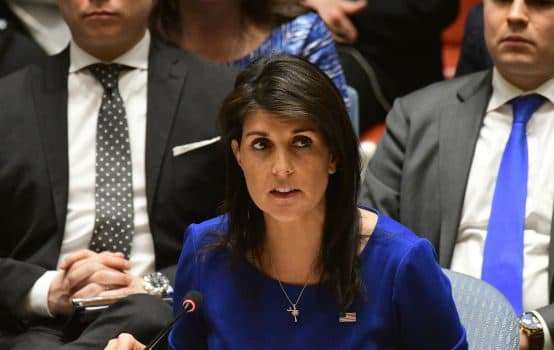
When Nikki Haley was tapped by President Donald Trump to be the next U.S. ambassador to the United Nations, most who were in the know scratched their heads. The governor of South Carolina seemed like a strange pick for this very important job—and not only because Haley had sparred with Trump during the 2016 Republican presidential primary. Unlike Richard Holbrooke and John Negroponte, Haley wasn’t plucked from the State Department’s diplomatic corps. And unlike Madeleine Albright and Susan Rice, she had very little—if any—foreign policy experience.
Haley, however, has proven herself to be a survivor, hitting the U.N. every chance she gets while ingratiating herself to Trump, who bemoans multilateral institutions in general and the United Nations in particular. From her very first speech in which she told U.N. members states (allies and adversaries alike) that “for those who don’t have our backs, we’re taking names,” Ambassador Haley has been the chief enforcer of the president’s America First foreign policy vision. Anyone can wail about the U.N. in the State Department briefing room, but Haley is in the eye of the storm, poking the international body—and doing it proudly—from within.
Haley’s latest broadside occurred this week when she announced the withdrawal of the United States from the U.N. Human Rights Council, a collection of 47 nations that focus on—you guessed it—human rights violations around the world. The U.N. as a whole is often depicted as a bunch of incompetents who suck the American taxpayer dry, and the Human Rights Council, which has featured some of the world’s worst abusers of human rights, is a standout example of why that image persists. The words and phrases Haley used to describe the Council during her briefing this week—“a protector of human rights abusers“ and a “cesspool of political bias”—are quintessential Trump and a reflection of the widespread conservative opposition to the Council ever since it was established 12 years ago.
America’s departure from the Council, of course, didn’t come out of nowhere. It was only a matter of time before Washington withdrew. Ambassador Haley has used the body as her proverbial punching bag from the beginning. And the Council’s intense focus—some would call it an unhealthy obsession—on Israel’s actions in the Palestinian Territories grates on Republicans and Democrats alike. Nations widely regarded as major human rights abusers (Egypt, China, Venezuela, Cuba, Russia, and Pakistan) have either served or are serving as members. Even the U.N.’s greatest admirers would admit that the Council has problems, the least of which is its pathetic criteria for membership.
- Is the United Nations Anti-Semitic?
- When U.N. Peacekeeping Goes Horribly Wrong
Haley wanted those problems addressed. She hoped to work with European allies to introduce more stringent vetting so countries with industrial-scale torture regimes weren’t able to be elected. She wanted Israel off the permanent agenda. When it became obvious that other members were not willing to cooperate, she chose the nuclear option.
It’s still far too early to tell whether the administration’s decision will pay off. The benefits of withdrawal are clear enough: the American delegation will no longer have to sit in the room and listen to lectures about human rights coming from countries that are, strangely enough, human rights violators.
The costs, however, outweigh whatever symbolic and moral benefits Washington has accrued. Absent from the table, the United States is no longer a player. Crimes that America wishes to bring to the Council’s attention may now be ignored altogether. Israel will be even more exposed to censure. The Trump administration is forfeiting its right to influence whatever debates are on the Council’s docket, a sophomoric move that will impact the U.N. human rights agenda. Yet again, the U.S. is isolating itself from the rest of the global community. First it was the Trans-Pacific Partnership. Then it was the Paris climate change and Iran nuclear agreements. Now it’s the Human Rights Council.
For Nikki Haley, this is a personal win and a nice notch on her belt as she thinks about her political future. For the United States, it’s something altogether less encouraging.
Daniel R. DePetris is a foreign policy analyst, a columnist at Reuters, and a frequent contributor to The American Conservative.
Sourse: theamericanconservative.com






